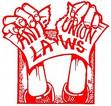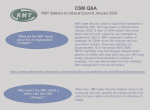Tuesday, 10th of September '13
Similar topics:
Attached documents
Briefing: Anti-Union Laws
 This briefing itemises anti-trade-union legislation since 1980. It then looks further back into history, and examines some of the key issues in Britain's anti-union laws.
This briefing itemises anti-trade-union legislation since 1980. It then looks further back into history, and examines some of the key issues in Britain's anti-union laws.
1980 Employment Act
- Definition of lawful picketing restricted to own place of work
- 80% ballot needed to legalise a closed shop
- Funds offered for union ballots
- Restricted right to take secondary action
- Code of practice (six pickets)
- Repeal of statutory recognition procedure
- Restricts unfair dismissal and maternity rights
- Unfair dismissal rights from 1 year to 6 months in companies under 20
1982 Employment Act
- Further restrictions on industrial action - eg. definition of trade dispute
- Further restricted action to 'own' employer
- Employers could obtain injunctions against unions and sue unions for damages
- 80% rule extended to ALL closed shops every 5 years
- Compensation for dismissal because of closed shop
- Removed union only labour clauses in commercial contracts
1984 Trade Union Act
- EC elections every 5 years by secret ballot
- Political fund ballots every 10 years
- Secret ballots before industrial action
1986 Public Order Act
- Introduced new criminal offences in relation to picketing
1988 Employment Act
- Unions to compensate members disciplined for non-compliance with majority decisions
- Members can seek injunction if no pre-strike ballot
- Union finances to be open to inspection
- Unions prevented from paying members’ or officials’ fines
- Action to preserve post entry closed shop made unlawful
- New restrictions on industrial action and election ballots
- Ballots for separate workplaces
- Ballots for non-voting EC members
- Election addresses controlled
- Independent scrutiny
- Establishment of CROTUM (Commissioner for the Rights Of Trade Union Members)
1989 Employment Act
- Tribunal pre-hearing review and proposed deposit of £150
- Exemption of small employer from providing details of disciplinary procedures
- Restricts time off with pay for union duties
- Written reasons for dismissal now require 2 years' service
- Redundancy rebates abolished
- Abolition of training commission
1990 Employment Act
- Attack on pre-entry closed shop - unlawful to refuse to employ non-union member
- All secondary action now unlawful
- Unions liable for action induced by ANY official unless written repudiation using statutory form of words sent to all members
- Selective dismissal of strikers taking unofficial action
- Extended power of CROTUM
1992 Trade Union & Labour Relations (Consolidation) Act
- Brings together all collective employment rights including trade union finances and elections; union members' rights including dismissal, time off; redundancy consultation; ACAS, CAC and CROTUM; industrial action legislation
- Does not cover individual rights like unfair dismissal, redundancy pay, maternity etc (these are covered by 1978 EPCA)
1993 Trade Union Reform and Employment Rights Act
- Individuals can seek injunction against unlawful action
- Creation of Commissioner for Protection Against Unlawful Industrial Action
- 7 days notice of ballots and of industrial action
- Members to be involved in ballot to be identified
- Attack on Bridlington procedures
- Written consent for check-off every three years
- Financial records, including salaries, to be available
- Checks on election ballots
- Independent scrutiny of strike ballots
- All industrial action ballots to be postal
- Postal ballots on union mergers
- New powers for Certification Officer to check union finances
- Higher penalties against unions failing to keep proper accounts
- ‘Wilson/Palmer’ Amendment (sweeteners to those moving to individual contracts)
- Unlawful to dismiss heath & safety rep in course of duties and those walking off unsafe site
- Right of individual to challenge collective agreement in contravention of equal treatment terms
- Changes to Transfer of Undertakings Regulations
- Changes to redundancy terms (consultation)
- Abolition of Wages Councils
- Changes to Tribunals and EAT procedures
1999 Employment Relations Act
- Amendments to Trade Union Labour Relations (Consolidation) Act 1992
- Recognition and negotiation procedures for employers with at least 21 workers, establishment of bargaining unit
- Derecognition from loss of trade union independence or majority support of bargaining unit
- Complaint process for use of political funds and breach of union disciplinary, electoral or other internal rules
- Dismissal for participation in official industrial action deemed unfair
- Ballot and notice provisions for strike or industrial action
- Abolishes offices of Commissioner for Rights of Trade Union Members and Commissioner for Protection Against Unlawful Industrial Action
- Funds to be provided to assist in developing employment partnerships
- Amends Employment Rights Act and TULRA to prevent complaint over unfair dismissal if action for purposes of national security
Information from the Institute of Employment Rights
History
- Anti-union laws go back to the time of the Pyramids: 5,000 years ago
- 1306: Royal Proclamation Against Congregations and Chapter
- 1799-1800: Anti-combination laws
- 1859: Tolpuddle Martyrs transported to Australia for swearing illegal oaths ie. organising a union
- 1906: Taff Vale Railway Company vs Amalgamated Society of Railway Servants (ASRS, forerunner of RMT) judgment: unions liable for loss of employers’ profits caused by strikes; overturned by Trades Disputes Act 1906
- 1909: Osborne judgment: trade unions could no longer use their funds for political purposes; overturned by Trade Union Act 1913, which allowed unions to have political funds that members can opt out of
Since 1979
- Tories introduced anti-union legislation salami-style, because the unions were strong enough to defeat a full-scale legal assault.
- There was a progressive weakening of trade unions, via legislation and their own ineffectiveness
- Legislation in response to major strikes eg. Grunwick, miners
- Lack of democracy in unions (eg. Leaders elected for life) opened the door for the Tories’ anti-union laws
Issues and arguments
- While governments claim that union legislation gives ‘fairness’, there are no ‘mirror-image’ laws for employers eg. no requirement to elect the Managing Director every five years, or to hold a ballot before imposing changes to terms and conditions!
- Legal requirement for industrial action authorised by postal ballots rather than workplace meetings:
- workers vote at home, where they are under different pressures
- the time taken to hold the ballot delays the action
- the ballot does not include discussion on details of what action is taken, whereas a workplace meeting can
- Despite anti-union laws, workers do still have the right to strike, and the union needs to remind and reassure them of this
Key Messages
- All improvements to our rights have been won by struggle.
- These laws do not exist to make industrial relations fair, but to stop workers fighting back.
- The timeline shows progressive attacks by government on union rights and effectiveness.
Further Reading
- Union Rights ... And Wrongs, John Hendy QC
This article was first published on the 5th or January, 2010
- 26529 reads






